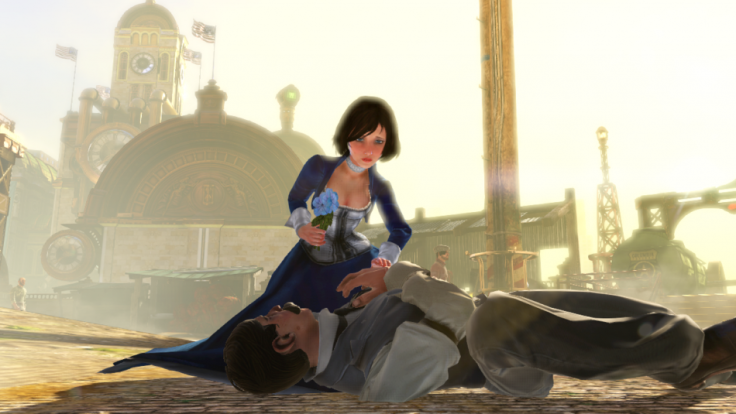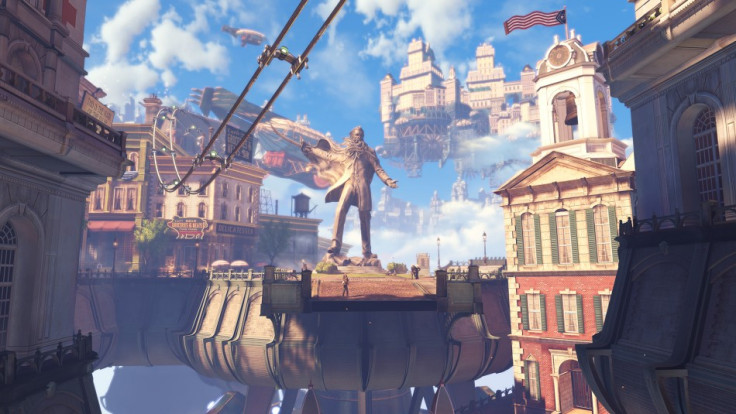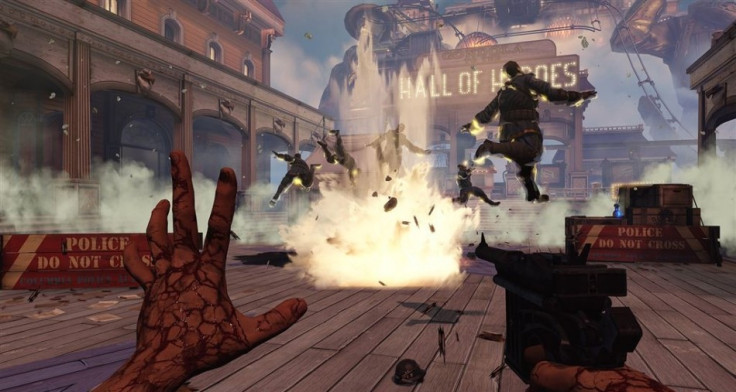BioShock Infinite Preview: We Could Go Anywhere From Here
Hands-on with the most important game of 2013

Key Features:
- Developer - Irrational Games
- Publisher - 2K Games
- Platforms - PlayStation 3, Xbox 360, Microsoft Windows
- Release date - 26 March, 2013
BioShock Infinite
It's rare that you have a physical reaction to a computer game. There are plenty of studies, we're sure, into how certain chemicals start flowing in your brain every time you play DOOM, but in terms of really feeling something, of watching the hairs on your arm stand on end and your eyes blur with tears - that doesn't happen often.
But such is the power of BioShock Infinite, simply the finest computer game we've ever played.
The start of something
In a sleek, gallery-like space on London's Whitfield Street, 20 or so journalists were invited to try the first five hours of Infinite, the latest work from writer and director Ken Levine, and his studio, Irrational Games. With its plush leather sofas, waiters serving canapés and HD televisions, Whitfield Space was hardly Manchester's Free Trade Hall - nevertheless, it felt like we were witnessing the start of something.
The first of several nods to the original BioShock, Infinite opens with you lost at sea. But this time, instead of swimming away from the wreckage of a plane, you're rowing to shore in a small punt boat, and when you reach the lighthouse you go up instead of down; Rapture was a city underwater. Columbia, in Infinite, is floating above the clouds.

It's a lazy cliché to say this, but the first time you see Columbia, it is, truly, breath-taking. Silent zeppelins drift by, rose petals flutter in the air; crackling piano music plinks on the soundtrack. The first hour of BioShock Infinite goes by without you even noticing, as you stagger from place to place indulging in Columbia's flawless, white beauty. Compared to the oppressive corridors of Rapture, Columbia really is the Eden that its citizens claim it to be - colourful, musical and calm.
But then it starts to feel wrong. Like Kubrick's Overlook Hotel, Columbia has this architectural offness to it that reflects something dangerous underneath. A man-made paradise on Earth, Columbia doesn't make sense - beaches are plonked right by industrial estates and the colour scheme is impossibly consistent. There are some obvious anachronisms, too, which give Columbia a frightening, surreal atmosphere; treading down a cobbled back street, we were suddenly greeted by an eerie barbershop version of The Beach Boys' "God Only Knows" cooing from a shop doorway.
It's a delight when you arrive, but Columbia soon begins to feel artificial and weird; the people, too, are just as strange.
Veneer
When we spoke to Ken Levine in November, he talked about the social discord in Columbia, and how the brown underclass and white upper class are prepping themselves for civil war. Those bubbling tensions are certainly present, with grotesque propaganda posters plastered all over the city, but what's more scary is that everyone seems to wear the same plastic grin. Wherever you walk in Columbia, people turn their heads to follow you, nattering between themselves about foreign invaders this, and Our Lord God that.
It's an absolutely terrifying place to be in, more Wicker Man than Rapture's Alien. And when the veneer finally drops and Columbia turns hostile, it's a good job that Infinite's combat is so finely tuned.

As well as Vigors, which take the place of BioShock's plasmids and give you magical powers, there is also Gear, wearable upgrades that are assigned to one of four empty slots to further enhance your fighting abilities. These open up a myriad of other combat options, like being able to give enemies an electric shock when you punch them, or automatically reloading your gun whenever you jump off of one of Columbia's overhead Skylines.
Vigors are much more gruesome than plasmids. "Murder of Crows" is particularly bloody, releasing a swarm of birds that pecks enemies to death. "Devil's Kiss" is a nasty one, too, a fireball that burns people right down to their skeleton.
But combat isn't Infinite's forte - it's not what the game is interested in. Killing people is still fun, and the guns are louder and more plentiful than in any other BioShock, but most of our playing time was spent just sightseeing Columbia, breathing in the lustrous scenery, and choking on the racist undertones.
Elizabeth
When you eventually meet Elizabeth, the entire city becomes a more exciting - and dangerous - place to be. She's revealed in what will come to be one of the most talked about sequences in all of computer games; it's tempting to spill details, but it's better that people see it for themselves.
Once she's rescued from the tower she's been kept in her whole life, everything sparks Elizabeth's interest. It's funny and distressing. When Booker tells her that the airship they're stealing will take them to Paris, it's kind of heart-warming that she believes him; when she doesn't understand why there are different toilets for white and black people, it's crushing.
She's a foil to Booker, who's wizened and wily, and has seen it all. He's more like us, the players - seasoned veterans who know how the game world works. So when Elizabeth grabs some perfectly mundane bit of scenery and jams it in front of the camera with an amazed look on her face, it's a bittersweet little reminder of how we used to be when we first played games; when we didn't know which bits of a level were and weren't important, and we thought we could open every door.
And that's how Infinite wants you to think - it wants to infect you with Elizabeth's enthusiasm, so you'll take the time to look around it entirely. There are so many details, on the walls, the floors - on the rigid faces of Columbia's citizenry - that you have to take the time to just look at Columbia if you're going to make the best of it.
Because after five hours with BioShock Infinite, during which we met Elizabeth, battled Klansmen and even encountered the terrifying Songbird, the real star of the game is Columbia itself. It's a sickly, menacing fever dream of a place, conjured up by a flagellating madman to appease some twisted version of God. Comstock, Columbia's president, is the typical Randian villain - compared to Andrew Ryan's belief that man is the ultimate entity, Comstock puts his faith in Heaven, mystics and superstitions to rescue people from their own fecklessness. You get the impression that if they were near each other, Columbia and Rapture would be at war, so different are the two city's ideals.
But at the same time, they feel similar. Infinite is still very much a BioShock game, with the same blend of narrative and interactivity, and the same predilection towards moral ambiguity. The white, aristocratic Founders are definitely bad men, but the working class Vox Populi Party that we glanced across in the demo is hardly better.
Unique
Infinite has been pushed back now until 26 March, but although the launch is still some months off, what's abundantly clear already is that this is a computer game the likes of which we've never seen. It not only embraces real-world topics; it discusses them in a way that is beautiful, intelligent and unique to videogames.
At the hands-on, Levine told us there was plenty of food and plenty of booze, and that we were free to play all night if we wanted. That's an attitude reflected by his and Irrational's work, which is consistently refreshing, and confident, and never patronises. It would be germane to reserve judgement until the full game comes out, but based on what we and the rest of the writers at Whitfield Space have witnessed, this will be the most defining point for computer games since DOOM first set the chemicals running.
BioShock Infinite makes you stop, look around and marvel at what videogames can do. We could go anywhere from here.
© Copyright IBTimes 2025. All rights reserved.





















